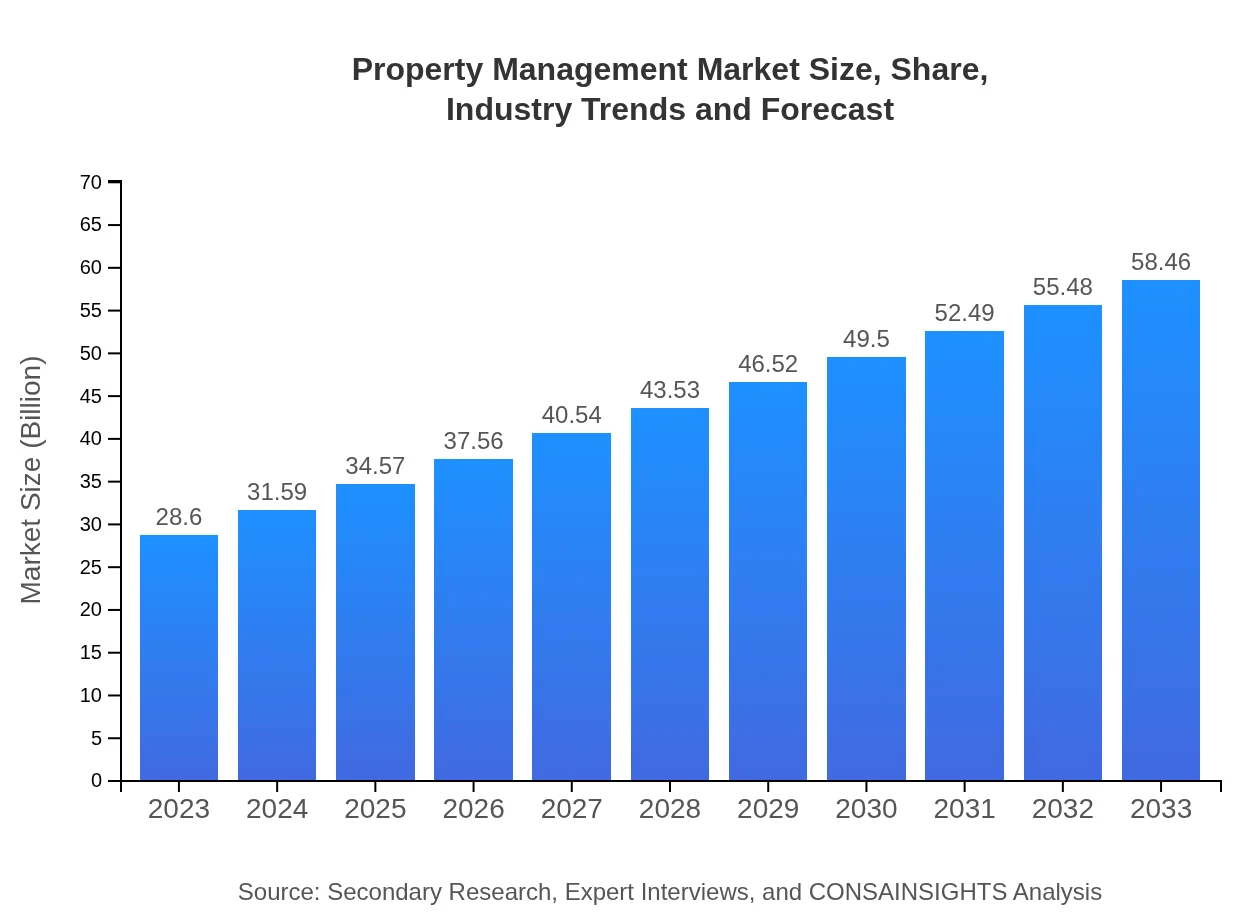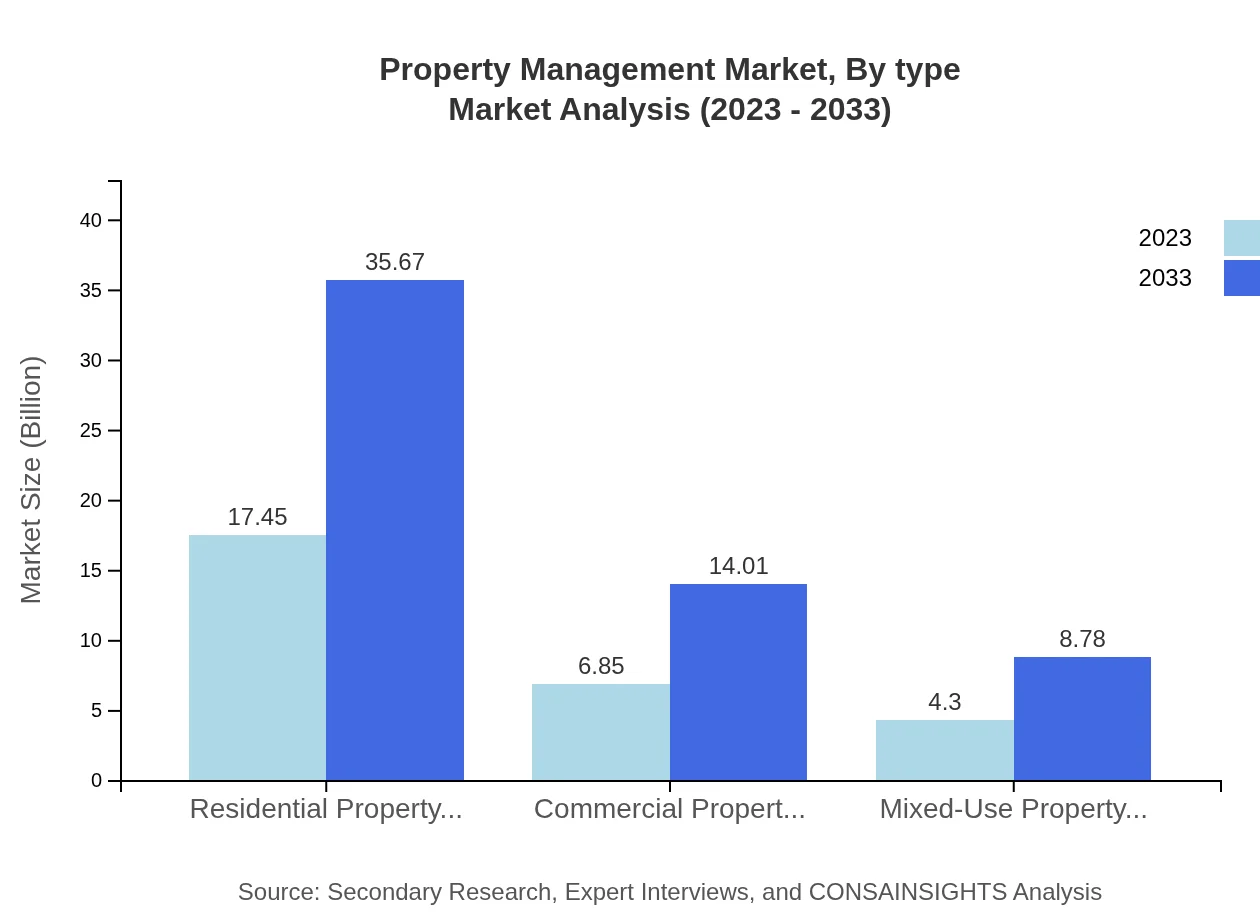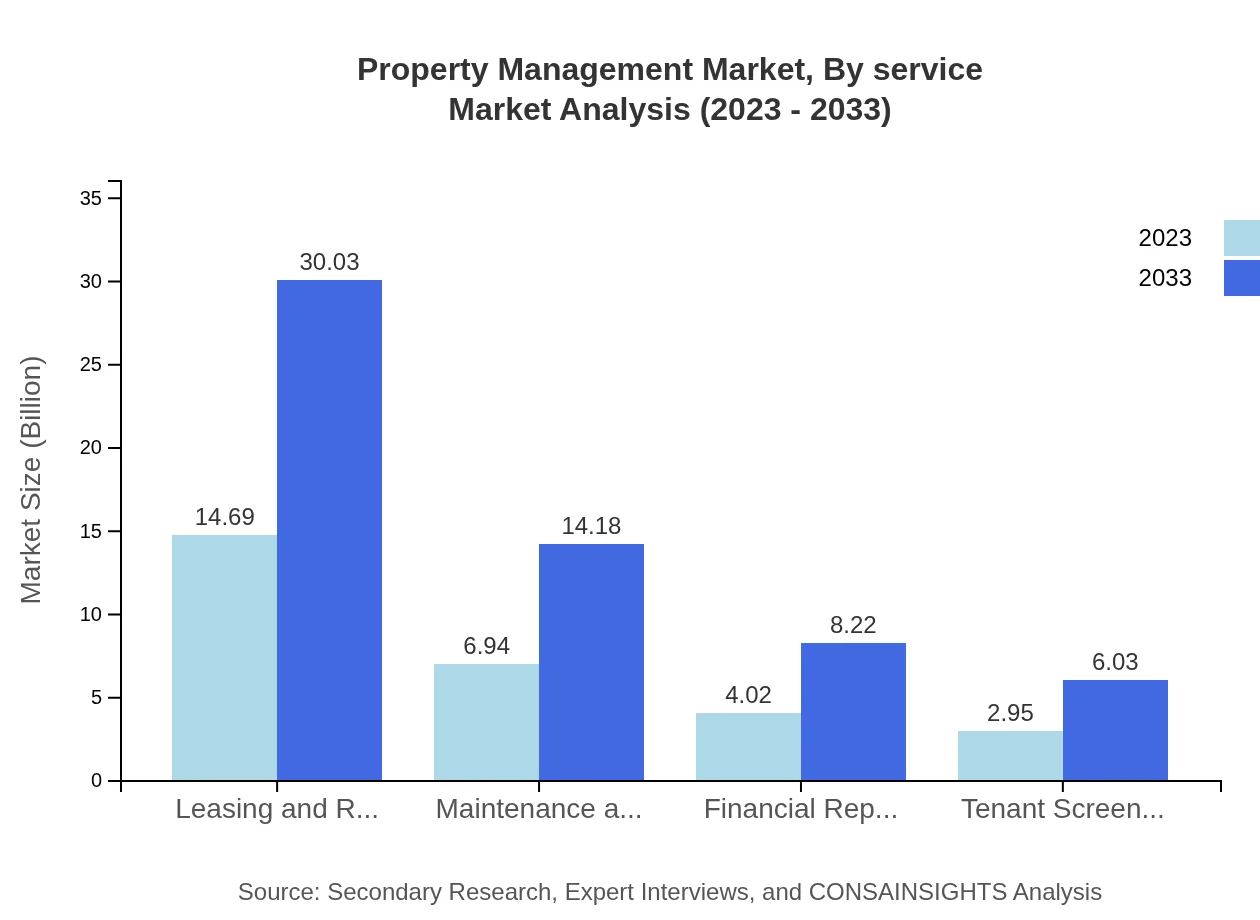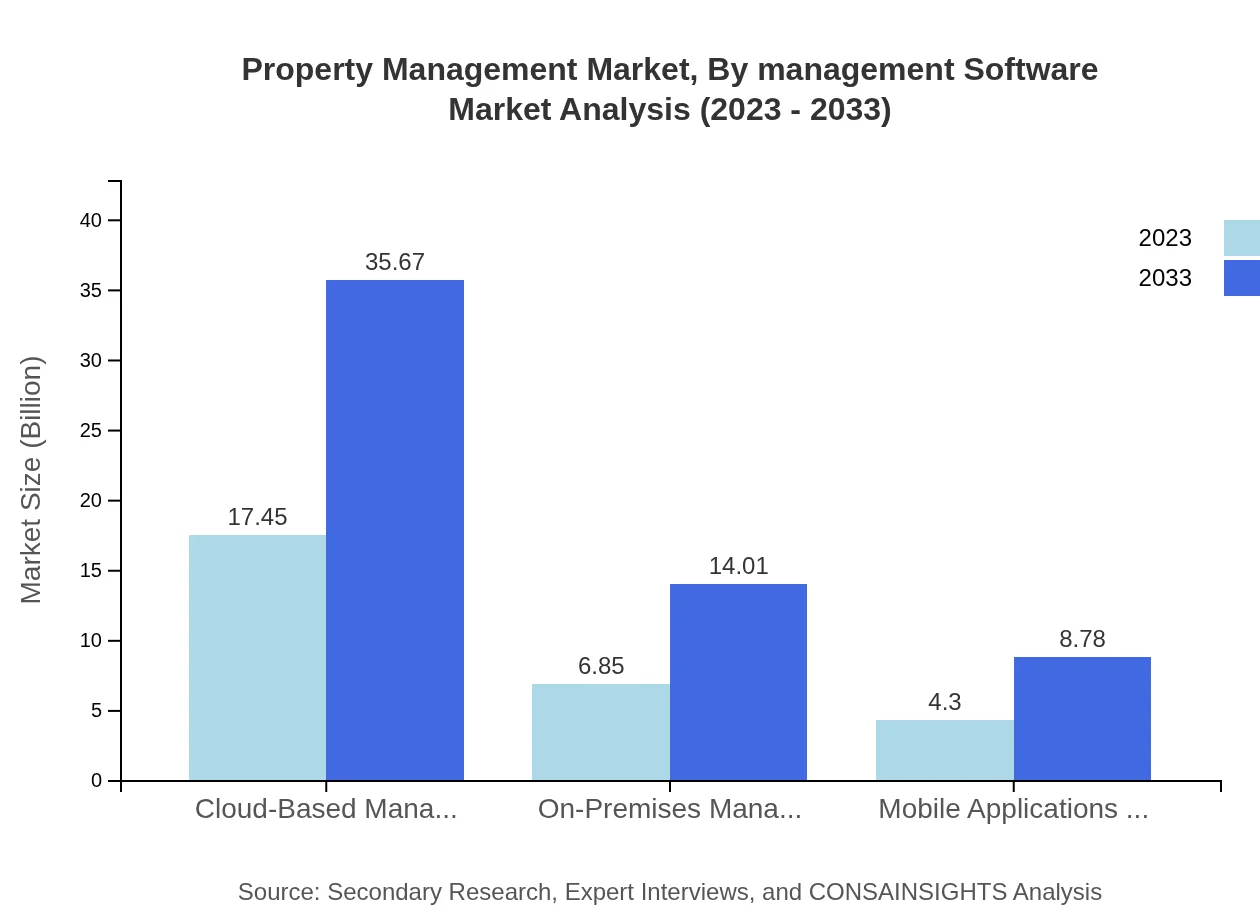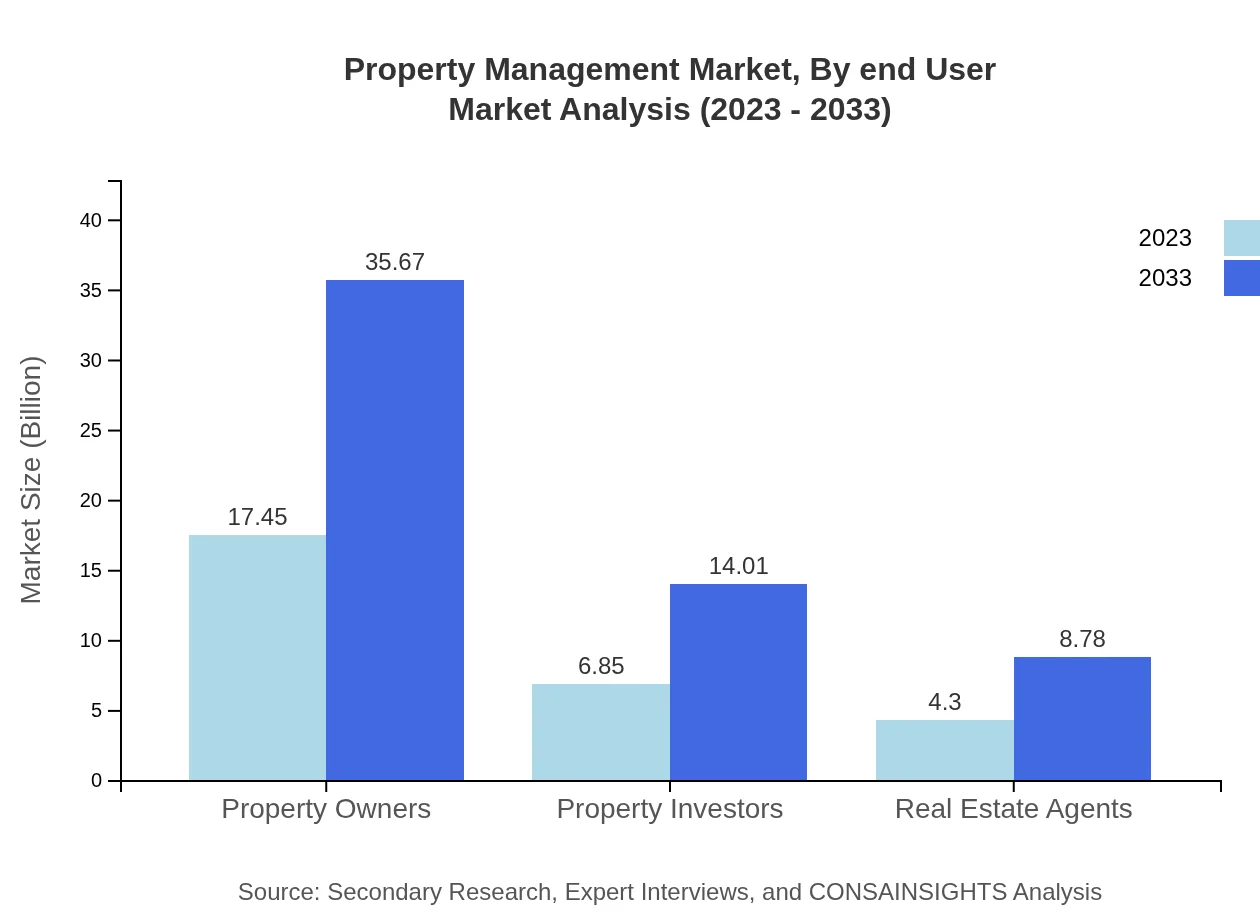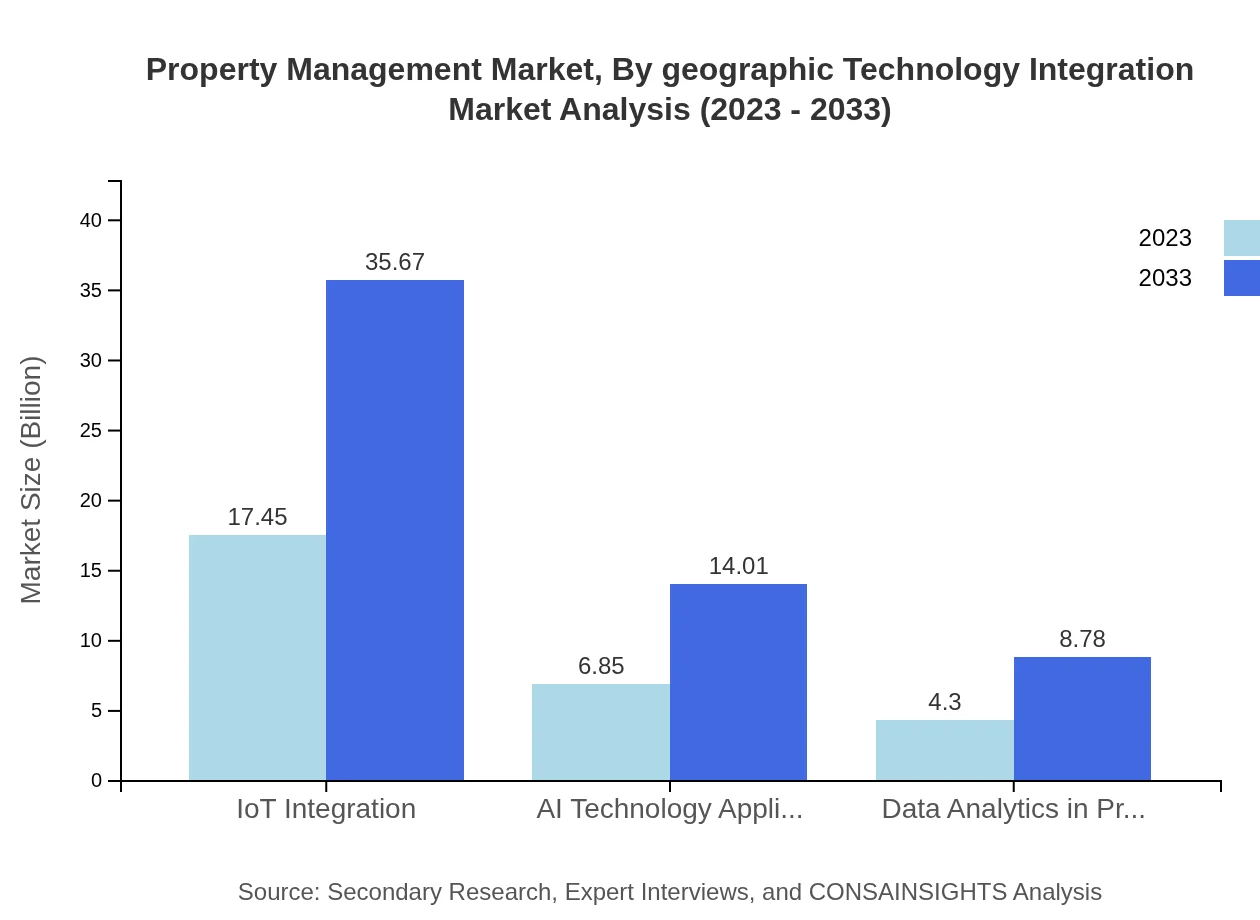Property Management Market Report
Published Date: 02 February 2026 | Report Code: property-management
Property Management Market Size, Share, Industry Trends and Forecast to 2033
This report provides a comprehensive analysis of the global Property Management market from 2023 to 2033, including insights into market conditions, growth trends, regional performance, and technology advancements that shape the industry.
| Metric | Value |
|---|---|
| Study Period | 2023 - 2033 |
| 2023 Market Size | $28.60 Billion |
| CAGR (2023-2033) | 7.2% |
| 2033 Market Size | $58.46 Billion |
| Top Companies | CBRE Group, Inc., Jones Lang LaSalle (JLL), Colliers International, Cushman & Wakefield, Knight Frank |
| Last Modified Date | 02 February 2026 |
Property Management Market Overview
Customize Property Management Market Report market research report
- ✔ Get in-depth analysis of Property Management market size, growth, and forecasts.
- ✔ Understand Property Management's regional dynamics and industry-specific trends.
- ✔ Identify potential applications, end-user demand, and growth segments in Property Management
What is the Market Size & CAGR of Property Management market in 2023?
Property Management Industry Analysis
Property Management Market Segmentation and Scope
Tell us your focus area and get a customized research report.
Property Management Market Analysis Report by Region
Europe Property Management Market Report:
Europe, with a market size of USD 9.82 billion in 2023, is expected to grow to USD 20.08 billion by 2033. The increasing focus on regulatory compliance, sustainability, and tenant rights drives demand for professional management services. Countries across Western Europe, particularly Germany and the UK, are significant contributors to this market.Asia Pacific Property Management Market Report:
The Asia Pacific region represents a rapidly growing sector in the Property Management market, with a market size of USD 5.12 billion in 2023, projected to reach USD 10.47 billion by 2033. The growth is fueled by increasing urbanization, heightened real estate investments, and a growing population. Countries like China and India are seeing substantial economic growth, leading to increased demand for residential and commercial properties.North America Property Management Market Report:
North America remains a dominant force in the Property Management industry, with a market size of USD 9.37 billion in 2023, projected to expand to USD 19.16 billion by 2033. The region's growth is primarily attributed to a robust economy, a high demand for rental properties, and the adoption of advanced technology solutions in property management practices.South America Property Management Market Report:
In South America, the Property Management market is growing, valued at USD 2.02 billion in 2023, anticipated to reach USD 4.13 billion by 2033. The growth is driven by improving economic conditions and urban migration, alongside a rising trend towards professional property management services. Brazil leads the market owing to its substantial urban real estate developments.Middle East & Africa Property Management Market Report:
The Middle East and Africa are emerging markets in the Property Management sphere, with a current market size of USD 2.27 billion expected to increase to USD 4.63 billion by 2033. Growing investments in real estate development, particularly in the Middle East, combined with urban population growth drive market potential in this region.Tell us your focus area and get a customized research report.
Property Management Market Analysis By Type
The segmentation by type encompasses Residential Property Management, Commercial Property Management, and Mixed-Use Property Management. Residential property management is the largest segment, valued at USD 17.45 billion in 2023, set to increase to USD 35.67 billion by 2033. Commercial property management follows, with a market size of USD 6.85 billion in 2023, expected to reach USD 14.01 billion. Mixed-use properties, combining residential and commercial spaces, will also see significant growth as urban areas continue to develop multifunctional spaces.
Property Management Market Analysis By Service
Services offered in property management include Leasing and Rental Services, Maintenance and Repair Services, and Tenant Screening and Selection Services. Leasing and rental services dominate the market, representing USD 14.69 billion in 2023, with an anticipated increase to USD 30.03 billion. Maintenance and repair services, crucial for property upkeep, stand at USD 6.94 billion, projected to grow alongside industry demands.
Property Management Market Analysis By Management Software
Management software plays a pivotal role in the property management sector. Leading categories include Cloud-Based Management Software, On-Premises Management Software, and Mobile Applications for Property Management. Cloud-based solutions account for the majority share, valued at USD 17.45 billion in 2023, expected to reach USD 35.67 billion by 2033. This segment thrives due to its flexibility, scalability, and enhanced client interaction capabilities.
Property Management Market Analysis By End User
The end-user segmentation encompasses Property Owners, Property Investors, and Real Estate Agents. Property Owners dominate the market, with a size of USD 17.45 billion in 2023, predicted to grow to USD 35.67 billion by 2033. Property Investors represent a significant proportion as well, valued at USD 6.85 billion, with growth expectations aligning with increased property investment activities.
Property Management Market Analysis By Geographic Technology Integration
The technology segment includes IoT Integration, AI Technology Applications, and Data Analytics in Property Management. IoT integration is gaining traction, valued at USD 17.45 billion in 2023, projected to grow alongside the demand for smarter buildings. AI technology applications are also critical, valued at USD 6.85 billion, as efficiency-driven solutions become prevalent in the market.
Property Management Market Trends and Future Forecast
Tell us your focus area and get a customized research report.
Global Market Leaders and Top Companies in Property Management Industry
CBRE Group, Inc.:
CBRE is a global leader in real estate services and investment. It provides property management services to a wide range of property types and is known for its innovative management practices and technology integration.Jones Lang LaSalle (JLL):
JLL is a professional services firm specializing in real estate and investment management. It offers comprehensive property management solutions, enhancing performance and tenant satisfaction through advanced technology and analytics.Colliers International:
Colliers specializes in commercial real estate and provides property management services that cover leasing, financial reporting, and maintenance, leveraging its global network to enhance property value.Cushman & Wakefield:
Cushman & Wakefield is a leading global real estate services firm, offering property management services focused on operational efficiency and tenant engagement, driving innovations across the industry.Knight Frank:
Knight Frank provides high-quality property management services across various property sectors, emphasizing strategic asset management to maximize investment returns.We're grateful to work with incredible clients.









FAQs
What is the market size of property management?
The global property management market is projected to grow from $28.6 billion in 2023 to an estimated market size in 2033, driven by a CAGR of 7.2%. Diverse sectors within property management continue to expand, reflecting robust demand.
What are the key market players or companies in the property management industry?
Key players in the property management industry include large corporations and technology startups focusing on innovative management solutions. Noteworthy companies leverage technology to improve efficiency, enhance tenant experiences, and maximize property value.
What are the primary factors driving the growth in the property management industry?
Growth in the property management industry is primarily driven by urbanization, increasing rental demand, and technological advancements. Furthermore, the push towards efficient management processes and services tailored for customers enhances market desirability.
Which region is the fastest Growing in the property management market?
The fastest-growing region in the property management market is Europe, with its market projected to expand from $9.82 billion in 2023 to $20.08 billion by 2033, showcasing significant growth opportunities across the continent.
Does ConsaInsights provide customized market report data for the property management industry?
Yes, ConsaInsights offers tailored market report data specifically for the property management industry. Clients can receive customized insights that cater to unique business needs and strategic objectives, facilitating informed decision-making.
What deliverables can I expect from this property management market research project?
Deliverables from the property management market research project include comprehensive analysis reports, market size estimates, growth forecasts, competitor analysis, and segmented data across various dimensions vital for strategic business planning.
What are the market trends of property management?
Current trends in the property management industry include increased adoption of technology, particularly in cloud-based solutions and mobile applications. Focus on sustainability and efficient operational practices is also shaping the industry's landscape.

